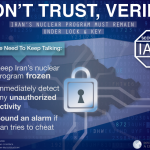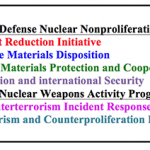
For terrorists seeking to develop a nuclear weapon or improvised nuclear device, the most challenging obstacle is the acquisition of enriched nuclear material. But after several security failures, there are concerns about whether the United States’ stockpile of HEU is secure.
Six Years Post-Prague
John Kerry Speaks on the 45th Anniversary of the Nuclear Non-Proliferation Treaty

This year marks the 70th anniversary of nuclear bombs being dropped on Hiroshima and Nagasaki in August 1945. In addition, the Nuclear Non-Proliferation Treaty (NPT) entered into force 45 years ago last week. This landmark treaty put a stop to the spread of nuclear weapons beyond five permanent members of the UN Security Council, and has been an enduring agreement that has made the world a safer place.
Fact Sheet: FY 2016 Defense Nuclear Non-Proliferation Program Restructuring Explained
By Greg Terryn and Sarah Tully The National Nuclear Security Agency (NNSA), through the Office of Defense Nuclear Nonproliferation, administers several non-proliferation programs, each working to mitigate nuclear threats. The programs (detailed below) facilitate collaboration with international partners and other US agencies to better secure, monitor, and dispose of vulnerable nuclear material (military and civilian) […]
Ignorance: the Greatest Obstacle to Overcome in Reaching a Deal with Iran

As negotiations to prevent a nuclear-armed Iran hang in the balance, former Congressman from Kansas Jim Slattery sat down with Barbara Slavin, Nonresident Senior Fellow at the Atlantic Council, to discuss Slattery’s recent trip to Tehran and his perspective of the current negations with a focus on the person-to-person aspect of the U.S.-Iran relationship. His insights provide a valuable glimpse into the atmosphere on the ground in Iran at this critical time.



